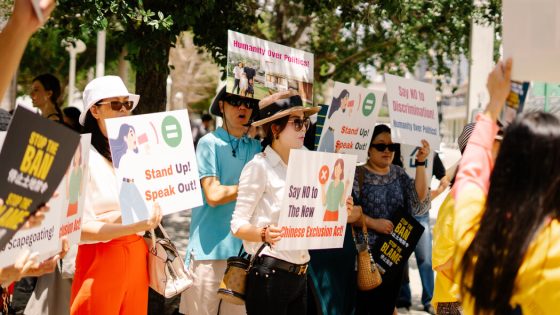After years of living in dorms and subpar apartments, Lisa Li could not wait to close on her new home.
The one-bedroom condo in Miami’s financial district had a view of the river, was in a safe neighborhood and, Ms. Li heard, had neighbors who were much like her — less party, more chill. So Ms. Li, a 28-year-old who came to the United States 11 years ago as a college student from China, put in an offer, had her bid accepted and began ordering furniture.
Then things took a sharp turn. At the last minute, the title company raised concerns about a small United States Coast Guard outpost near South Beach a few miles away. Her purchase, the company said, might run afoul of a new Florida law that prohibits many Chinese citizens from buying property in the state, especially near military installations, airports or refineries.
Under the law, Ms. Li could face prison time, and the sellers and real estate agents could be held liable. The deal collapsed.
“The whole experience was very hurtful and tiring,” Ms. Li said in a recent interview at a cafe in Miami, where she is still renting. “I just feel that, as someone who has lived and worked in this country for many years, and as a legal taxpayer, at the very least I should have the ability to buy a home that I can live in.”
More than three dozen states have enacted or are considering similar laws restricting land purchases by Chinese citizens and companies, arguing that such transactions are a growing threat to national security and that the federal government has failed to stop Chinese Communist Party influence in America.
Florida’s law, which went into effect in July, is among the furthest reaching. In addition to barring Chinese entities from buying agricultural land, it effectively prohibits most Chinese individuals without a green card from purchasing residential property. Gov. Ron DeSantis signed the measure just before launching his Republican presidential campaign, warning voters that China represented the biggest threat to the United States.
“Today, Florida makes it very clear: We don’t want the C.C.P. in the Sunshine State,” Mr. DeSantis said last year.
In more than a dozen interviews, Chinese residents in Florida voiced frustrations about being cut off from the ultimate American dream. Other residents of Chinese descent said they faced discrimination as they tried to buy a home. Some said they lived in fear over whether they may have inadvertently violated the law.
Civil rights and Asian American groups are unaware of anyone being charged with violating the law. But some people of Chinese descent said they feel the anti-China sentiment intensifying. The law is currently being challenged in federal court.
“I never felt any discrimination here before this law,” said Jin Bian, a Chinese software developer who works in Tampa and is among those now barred from buying property. “But now I’m wondering if I need to leave Florida.”
The law has also had an apparent chilling effect on the real estate industry, an important part of the state’s economy. Developers often rely on Chinese investors to help build projects in Florida, and the law appears to have barred such financing, prompting pushback from a prominent real estate lobbying group.
Yukey Hoo, a real estate agent in Winter Garden, a suburb of Orlando, estimated that she has turned away 10 potential clients — about one-fifth of her usual business — because she could not determine whether they were eligible to buy property.
The law technically applies to people who are “domiciled” in China and don’t hold U.S. citizenship or permanent residency, and much of the confusion has centered on what “domicile” means. Sellers and real estate agents can face up to one year of prison time for violating the law.
“Every day I am getting phone calls from people asking if they can buy a house under the law,” said Ms. Hoo, who has sold real estate in Florida for 10 years. “I tell them to talk to an attorney, but for those who aren’t sure about their status, we don’t want to take the risk.”
The Florida law restricts “foreign principals” from six other “countries of concern,” like Venezuela and Cuba, from owning property. But the most onerous restrictions — and harshest penalties — are specifically aimed at Chinese citizens.
The law was part of a broader package passed by the Florida Legislature last spring that included a bill restricting the state’s public universities and colleges from offering research positions to students from China and other countries. That law is also being challenged in court.
“The deeper that you look under the hood, the deeper that you see China has been clandestinely going after land grabs in the United States,” said State Representative David Borrero, a Republican from the Miami area who was one of the sponsors of the land law. “We can’t just have that in our backyard.”
Mr. Borrero disagreed with critics who said the property bill was discriminatory. “Our national security interests come first,” he said.
The Chinese government has a record of using economic coercion and espionage to further its geopolitical goals and, in recent years, both the United States and China have stepped up efforts to advance their spying capabilities around the world.
State lawmakers have been especially worried about Chinese investment in agricultural land and territory near military installations, fearing that China could throttle America’s food supply or use the land as a spy post. Chinese interests own less than 1 percent of foreign-held agricultural land in the United States, according to the U.S. Department of Agriculture.
National security experts said that the specific threat posed by Chinese people owning homes has not been clearly articulated.
Holden Triplett, a former F.B.I. counterintelligence official who led the bureau’s offices in China, said that Chinese citizens are more likely to have family ties to China that could be weaponized by state security agencies there. But he said categorical bans could further alienate a Chinese diaspora community that could be of particular help to the United States in the event of a conflict with China.
“We need to be careful about these blunt instrument laws,” said Mr. Triplett, who left the F.B.I. in 2020 and co-founded Trenchcoat Advisors, a risk management consultancy. “Let’s do the work to find out what’s happening and to see if there is another way we can address this problem.”
Civil rights groups and residents have challenged the Florida law in federal court on grounds that it violates the Equal Protection Clause and the Fair Housing Act, and that it undercuts the federal government powers on foreign affairs.
“There’s no evidence that Chinese homeownership poses harm to national security,” said Ashley Gorski, senior staff attorney with the American Civil Liberties Union, one of several groups that brought the suit.
Mae Ngai, a professor of history and Asian American Studies at Columbia University, said the Florida law recalled the alien land laws from the early 20th century, which effectively prohibited Asian immigrants from buying farmland and, in some cases, homes in many states.
“They saw Asians as an alien invasion that was going to take over America,” Dr. Ngai said.
After the bill was introduced last spring, the Chinese community in Florida began frantically organizing rallies and door-knocking sessions.
In Texas, opposition from the Asian American community, including a former Republican lawmaker of Chinese descent, helped roll back some provisions in a similar bill. But in Florida, the Chinese community is just 0.6 percent of the population. Many are first-generation immigrants who moved to the state to study or work at universities. And there are very few Asian American politicians in the Legislature.
The Florida activists’ dissent barely registered.
Lobbyists for the prominent hedge fund Citadel, which moved to Miami from Chicago in 2022 and employs a large number of Chinese citizens, were more effective and managed to secure an exemption for Chinese people on valid work visas to buy one primary residence as long as the property is smaller than two acres and not within five miles of a military installation.
But most of the initially proposed restrictions were kept in place, and the impact of the law was felt almost immediately.
Sunny Long, a real estate agent in Tallahassee, said that she now pores over Google Maps to approximate where her Chinese clients could be eligible to buy property. Florida has around 20 major military bases, many small military outposts and even more critical facilities like airports and water treatment plants that could be covered under the law.
“Many of my clients would like to buy in a certain neighborhood that has a good school district, but it’s too close to the airport,” she said. “It’s been a big test for me.”
Asian Americans are also concerned that the law has led to profiling of anyone perceived to be Chinese, no matter their citizenship or residency status.
One man said a real estate agent at an open house asked him if he was qualified to buy the house after he chatted in Mandarin with his parents.
Evelyn Yang, a real estate agent in Palm Beach Gardens, said that shortly after the law went into effect, she repeatedly made inquiries about an apartment in Miami on behalf of a Chinese client who had permanent residency. She didn’t hear back from the seller’s agent for days, she said.
“When they finally returned my calls, they just said, ‘Can your buyer buy? Can’t Chinese people not buy right now?’” Ms. Yang recalled. “They see that our names are Chinese and assume that we can’t buy.”
Such interactions could be considered intentional discrimination based on national origin, which is prohibited by the Fair Housing Act of 1968, said Scott Chang, senior counsel for the National Fair Housing Alliance. On Monday, the alliance and several other groups plan to announce a new lawsuit making that allegation.
Nearly one year after her home-buying attempt fell through, Ms. Li, the renter in Miami, still vividly recalls the days spent frantically trying to salvage her deal.
The desperate calls to attorneys and state lawmakers. The time spent calculating distances. Ms. Li’s real estate agent even drove to the Coast Guard outpost on South Beach to try to determine if it was a “military installation” under the law.
Ms. Li said she still loved living in Miami. It was clean compared to New York City, where she lived before. She loved taking tennis lessons at the courts in Palm Island Park and exploring the diverse food scene with her friends.
But the experience left her with a bitter taste.
“I think I may just have to leave,” she said. “Who knows what policies they might come up with next?”
Source Agencies



